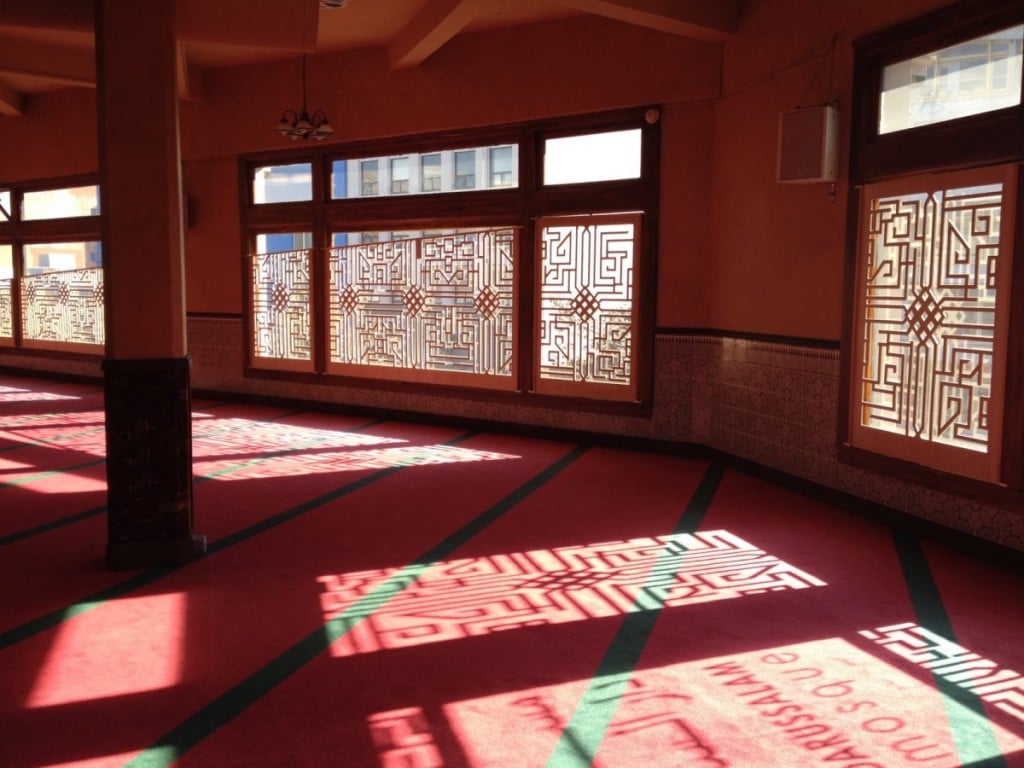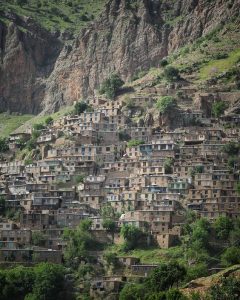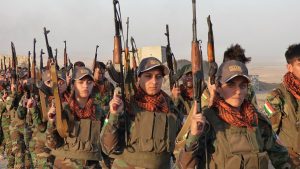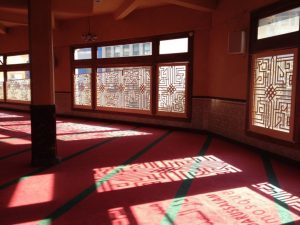#Culture
No, My Son | A Short Story
It was pure happenstance that Payedar Olan was sitting near the entrance of the masjid on the day the gunman entered and shot him. He had forgotten that here in America they changed the time twice a year…
Published

It was pure happenstance that Payedar Olan was sitting near the entrance of the masjid on the day the gunman entered and shot him. He had forgotten that in America they changed the time twice a year, so he was an hour early for Friday congregational prayer. The little masjid at the top of a hill was almost empty, with only a few brothers praying, and one washing up in the ablutions room. So he sat with his back against the wall to relax and wait.
Such a strange thing, this time changing. The sun rose and set. How could men change it? But in America they believed they had power over all things.
Life here was bewildering. People zipped around on electric scooters, in Uber cars and in trains that rumbled beneath the ground. Skyscrapers blocked the sun. People wore strange costumes, and one could often not tell a woman from a man. The markets contained more food than anyone could need, much of it artificial, tasting too salty or too sweet. People smiled for no reason, while crazy people wandered the streets, shouting at nothing.
Keep supporting MuslimMatters for the sake of Allah
Alhamdulillah, we're at over 850 supporters. Help us get to 900 supporters this month. All it takes is a small gift from a reader like you to keep us going, for just $2 / month.
The Prophet (SAW) has taught us the best of deeds are those that done consistently, even if they are small. Click here to support MuslimMatters with a monthly donation of $2 per month. Set it and collect blessings from Allah (swt) for the khayr you're supporting without thinking about it.
This city and country had taken him in and given him shelter when his own homeland was being devoured by evil men; so he was grateful. Still, it was perplexing, and so far removed from his experience that sometimes he felt he was on a different planet.
The Kurdish Heart
Payedar had been born in 1953 in Iraqi Kurdistan, in a mountain village called Gur-e-Sofia, reachable by traveling first on the Ruwandiz road from Erbil, then by a three hour climb up a mule track. His bav was a duck hunter, and his dê a midwife.
In his village, whitewashed homes were built into steep hillsides in tiers, facing the sun. The mud of the roofs had to be rolled anew every September, before the winter rains, because in summer it would crack. Sheep and goats dotted the slopes. Most people grew barley or bearded wheat, and tobacco in summer, using oxen to plow the fields. Every family knew precisely how much water they could take for irrigation, and no one took more than their share, for fairness was ingrained in the Kurdish heart.
Walnut trees grew everywhere, and Payedar would shake them to bring the walnuts down, then crack them between two stones. Because of this he was never hungry, alhamdulillah.
He remembered his bav, his father, sitting at the village coffee shop, smoking rich Kurdish tobacco from a hookah pipe, and shouting exultantly as he won a round of backgammon. At home his dê cooked spiced kofta meatballs, bulgur pilaf and flatbread, with figs and sweetened black tea for dessert. Payedar, his parents and six siblings ate on the floor, sitting around a clean cloth. At night Bav led them in prayer, reciting the Quran in his powerful voice.
It was life, and he was happy, until he was eight years old and the Kurdish-Iraqi war began. His three older brothers and one sister went to fight and never returned. The village was bombed. Many were killed and many homes were destroyed. Even the small masjid was reduced to rubble. His bav fell into despondency, and one day went out to hunt ducks and blew his own head off.
Payedar, the eldest remaining child, became the breadwinner. Twice a month he loaded up a mule with white grapes, tobacco and walnuts and traveled over the mountain to Erbil, the capital of Iraqi Kurdistan, where he sold them at a good profit. It was hazardous work. More than once he was injured. Three times he was robbed.
These dangers were balanced by getting to see Erbil, a city of a million people. A million! Where ancient Assyrian and Roman monuments and citadels mixed with four-story buildings and a modern soccer stadium. Women went out with their forearms uncovered, people wore Western jeans and shirts, and music played from boomboxes sold in shops filled with electronic goods. At the same time, Erbil was a frequent target of Iraqi bombs, and it was not unusual to see bodies in the streets.
The Dying and the Dead
The war ended when he was seventeen, and began again when he was twenty one. This time he joined the Kurdish peshmerga and fought the Iraqi invaders, sending his salary home to his mother.
It was in the war that he met his wife, Letya. Her name, which meant tiny and womanly, matched her stature, if not her personality, for she too was a member of the peshmerga, and the first time he saw her she was in a soldier’s uniform with a Soviet rifle in her hands, her fierce black eyes promising death to the enemies of the Kurds, and her long black hair streaming in the hot southern wind.
He killed many men, and saw many die. Back home in Sofia-e-Gul one of his two younger sisters got married and moved away, while the other, out one day foraging for food, was kidnapped by Iraqi soldiers, raped and killed. Shortly afterward his mother died of loneliness and heartbreak. He returned home to bury her, his tears falling into the rich mountain soil atop her grave. Sofia-e-Gul was now populated only by old people waiting to die, and by the dead in the cemetery. The fields lay untended, many homes half-destroyed, the animals lost. He prayed, begging Allah’s forgiveness for leaving his mother alone. He did not ask for Allah’s mercy on his mother, for it was unnecessary. She was a saint, and if anyone in the world deserved Paradise it was her.
He left Sofia-e-Gul and never returned.
Payedar and Letya were married as the war raged, and when the Kurdish militias lost and the Kurdish region was overrun by Iraqi troops, they fled to the Kurdish border region in Iran. There Payedar worked as an assistant to a stone mason. He and Letya raised two boys and a girl.
These were the things Payedar was thinking about as he sat with his back against the wall in the little masjid. Lately it seemed his mind dwelled more in the past than the present. Sometimes he found himself standing on a street corner in this American city, thinking about the feel of his father’s bristly mustache when he kissed Payedar goodnight, or the smell of his wife’s hair, redolent with the day’s cooking – or, if she had bathed, with the scent of fermented rice-water shampoo. Then someone would interrupt his reverie, some Spanish girl with green hair, or a goateed man with earrings and a baby in a belly sling, and ask if he was alright. And he would smile and thank them.
He had no complaints about the way his life had turned out. He’d lost so much, yes. But he’d been a fighter all his life, and what more could any man do? Everything was in Allah’s hands. Whatever had happened was always going to happen, and whatever had passed him by was always going to pass him by. There was nothing he could say in the end but alhamdulillah. And if he was fortunate, he would meet his lost ones in Jannah, and all would be well.
Boots On
The gunman entered with his boots on. That was the first thing Payedar noticed, glancing to his left and seeing the military boots on the plush carpet of the prayer room. His eyes shot up to take the man in: tall, white, with a powerful frame. Green eyes and a scattering of freckles across his cheeks. Brown hair in a buzz cut. Dressed in green army fatigues, and carrying a semi-automatic rifle. The gun was pointed toward the mehrab as the man’s head swiveled, taking in the interior of the masjid.
The man seemed confused. Maybe he too had been fooled by the time change, and was expecting to find a full congregation. Maybe his eyes were adjusting to the gloom, for the interior lights had not yet been turned on, and the masjid was all cool shadows and lazily spinning ceiling fans.
The gunman’s hesitation gave Payedar the time he needed. He leaped up and embraced the man tightly, throwing his arms over the man’s arms, pinning them to his sides so that the rifle pointed at the ground. “No, my son,” Payedar said intensely, whispering in the man’s ear as if telling secrets to a confidante. “No.”
“Get off me you goddamn terrorist!” the man bellowed. He struggled, nearly falling. He was strong, but Payedar also was strong, for though he was sixty seven years old he had been a stone mason for decades, and the work had given him a broad back and muscular arms.
“No, my son,” he said again, his voice rising. “I will not allow it. I cannot, I cannot.” He heard other men shouting in panic and confusion, but he did not turn to look.
“I’ll kill you!” the man drove forward, but Payedar held on. The gun went off. The sound ricocheted off the walls like the roar of a cannon. Someone screamed. Payedar’s foot exploded with pain. Starbursts appeared before his eyes. Yet he kept his arms clasped. “No, my son,” he said again, desperately. ‘No, my son.” He was pleading, but not for his life. He and death were old friends or old enemies – he could not tell anymore. Sometimes you hated a man but admired him. So it was with Payedar and death. No, he was pleading for this man to understand, to stop before it was too late.
“GET OFF ME YOU CRAZY OLD MAN!”
Again the gun fired, and this time it was as if a sword had been driven into Payedar’s thigh. He closed his eyes and groaned in agony, but held on. Again he pleaded, his voice filled with something that might have been anger but might also have been love, and this time it was a shout, driven by pain and desperation. “No my son!”
The gunman stopped struggling. Payedar felt the man’s body go limp within the circle of his embrace. He opened his eyes to meet a gaze filled with hatred and rage, but also confusion and shame. Now that the man had stopped struggling, Payedar seemed to have lost his own ability to fight, as if he had drawn his energy from the other’s seething will. His arms grew slack and the world turned monochrome, as if he were seeing everything on the old television he and Letya had purchased when the children were still small and still alive. Pain filled his mind, and he could not stand.
Arms seized Payedar and the gunman. Both fell. Men were atop them, shouting in Arabic and English. Payedar’s mouth fell open as his eyelids came down like steel doors.
His Young Prince
Two surgeries and a week in the hospital, and he was on his way to recovery. People said he was a hero. Visitors from the masjid were allowed in two at a time, but Payedar found their visits tiring. Reporters wanted to see him, but his son Ekrem shielded him. Payedar had no desire for fame. Police came as well. He told the story in halting English, and picked the gunman out of a selection of photos on a card.
Sometimes he did not know where he was. A hospital, but he had been in many clinics and field hospitals. He had been shot twice before, bombed, struck with grenade shrapnel, and tortured in an Iranian jail, where he was accused of being a Kurdish separatist.
When he became confused he remained silent and waited stiffly. Eventually Ekrem would appear, sometimes with his beautiful wife Amirah, and Payedar would relax, for even if he did not know where he was he knew that Ekrem was his young prince, his joy and legacy, and that if Ekrem was there then everything was fine.
Later, he awoke on the sofa in Ekrem’s living room. Usually he slept in a tiny upstairs room, but he had a titanium rod in his thigh and a cast from knee to toe. He let out a groan. His leg and foot ached as if a lion were gnawing on the bones. He’d experienced worse pain in life. But he was old now.
Amirah stood over him, speaking. “Apê. Tu dixwazî hin çay bi şekirê dixwazî? Dem dema dermanê we ye.” Uncle, would you like tea with sugar? It’s time for your medication.
Payedar smiled at this princess, this beautiful African-American Muslim woman who had given him two grandsons and had even learned Kurdish!
Trying not to show how much his leg hurt, he rubbed his eyes and yawned. “How about some mast-aw?” he replied in Kurdish. It was an old joke. Mast-aw was a Kurdish favorite: heated goat’s milk mixed with sour goat’s milk to curdle it, then with cold water. Of course it could not be found in America.
“Honey,” Amirah called in English. “He wants mast-aw.”
“Coming up.” Ekrem emerged from the kitchen carrying a tray with a single glass of milk perched in the center, and four pills beside it. The boys trooped at his heels, grinning. Payedar looked at his son, with his curly hair and long, proud nose. He was sturdy, for he too was a stonemason, having learned at Payedar’s side.
Payedar smiled at this prank. The pasteurized, homogenized milk sold in America was a far cry from mast-aw. But he took the glass without complaint, and downed a few pills. His eyes widened. The drink was thick and tangy, rich with the flavors of his homeland. It was mast-aw! He had not tasted it in many years, and for a moment the flavor took him back, so that he was a child, sitting on the floor with his parents and siblings after a long day of trooping over the mountains with his bav. The children enjoyed mast-aw and boiled wheat with sugar, and when his older brother tried to talk about the war Bav shushed him. His sister told a joke about a cat that tried to ride a bicycle, and Payedar laughed.
Remembering this, he laughed again, and witnessing this, Ekrem and his family laughed as well, and Payedar returned to the present. “This is miracle,” Payedar said in English, and his family grinned and told him how they had sourced all the ingredients.
Moments like this were a barakah, and Payedar was filled with gratitude to Allah. If only… he faltered, his hand shaking, nearly dropping the glass, so that Amirah took it quickly. A tear ran down his cheek. Ekrem was beside him, touching his shoulder. “What is it, Bav? Is something wrong?”
Payedar shook his head. “You are the spirit of my heart, Ekrem. All of you.” He reached a hand to his grandsons and they piled onto the sofa. “I wish…” He could not continue. He wished Letya, his wife, could have lived long enough to see this new land. And Sara, his daughter, gassed by Saddam Hussein along with her husband and children. And Baz, his firstborn, a lifelong soldier.
Ekrem rubbed his shoulder. “I know, Bav.”
“Can I try the mast-aw?” This was Ibrahim, his youngest grandson, a wide-faced boy with curly black hair and dark eyes, only four years old. His mother gave him the glass and he took a sip, then coughed and grimaced. “Eww!”
Payedar chuckled. “You are American boy. You better stick to apple juice.”
* * *
An assistant district attorney came to see him. A rail-thin blonde woman with spectacles like tea glasses. The gunman, whose name was Amundsen, had so far refused to speak to the police. He said he would only speak to, “the old man.”
“Meaning you, Mr. Olan,” the ADA said. “You’d be doing us a favor.”
Good Crazy or Bad Crazy
They met in a room in the county jail building. It was painted steel gray, with a thick window beyond which a tall black guard watched. There were no cameras or listening devices, as far as Payedar could tell.
The gunman, Amundsen, sat across from Payedar at a metal table that was bolted to the ground. The man wore orange jail coveralls with “JAIL INMATE” printed on the chest and back. He was handcuffed, his ankles shackled, another chain connecting hands and feet to a belly chain, and the whole mess chained to a steel eye loop welded to the table. The man was unmarked. No bruises or burns. Back home he would have been tortured until he confessed. Here they had to appeal to him, negotiate, reason. America was crazy. But good crazy or bad crazy? Both, Payedar supposed.
Payedar wore the traditional clothing of his homeland: a dark vest over a white robe, a black turban, and boots. He did not always dress thus. Sometimes he wore typical Western clothing. He was not sure why he had chosen to dress this way today.
The gunman eyed him. There was some hostility in that look, but not as much as Payedar had expected. The man seemed almost curious. “You speak English?”
“Yes. I learn.”
The chains rattled as Amundsen gestured to Payedar’s leg. “You gonna be alright?”
Payedar nodded.
“You really messed me up.”
“You mess up yourself.”
“Yeah.”
Neither of them said anything for a while. Payedar studied the gunman. The man’s eyes were intelligent, his jaw set tightly. A forearm tattoo peeked out beneath the sleeve of his coverall. His torso was as wide as a barrel. Payedar was amazed he’d been able to hold the man. In fact, he could not see how it was possible.
“Why did you say that?” the gunman wanted to know.
“Say what?” Though he knew.
“You know. You called me your son. You kept saying that. Even when I shot you. What the hell, man? I’m not your son.”
Payedar flushed with embarrassment. But he had agreed to talk to the man, so he answered. “Sometimes I get confused. At that time I thought you was my son, Baz.”
Amundsen stared, then shook his head and laughed. “Unbelievable. I got stopped by a senile old kook. Do I look like your son?”
“Little bit. Big and strong. He was soldier, fighting the Iraqis. Seven years ago, when ISIS start to invade our land, Baz come to me, say he going to fight them. I did not want. I lose so many people already. So I hug him, I tell him, no, my son. Do not go.”
Amundsen frowned. “Your son was going to fight against ISIS? I thought you Muslims supported ISIS.”
“You are fool!” Payedar snapped. “Never say this. Do you understand what ISIS did to my people? They attack the Yazidi villages because the Yazidis are Christian, not Muslim. So ISIS kill the men, take the women and rape them. My son cannot accept this, so he go to fight, to protect them.”
“So…” Amundsen’s mouth hung open as he took in what Payedar was telling him. “Your son fought to protect Christians?”
“Muslim, Christians, one people. They are Kurds.”
“What happened to him?”
“What you think?” Not wanting to speak it out loud.
The room fell silent. Payedar looked around absently, taking in the clean floor and walls, the even light from the fluorescents embedded in the ceiling. He looked at the jail guard on the other side of the window, who stood calmly, watching them both. Payedar’s mind wandered, traveling through time, crossing borders and eras in an instant, feeling the touch of his wife’s lips on his cheek, whispering her love. She had loved him like a fighter, fiercely, unreservedly. Then his mind swept forward like a flash flood in a mountain ravine, and he was once again in the present, in this tiny room in a foreign city far from home. His gaze returned to Amundsen, who in turn studied him silently. No one spoke.
The end
See the Story Index for Wael Abdelgawad’s other stories on this website.
Wael Abdelgawad’s novels, Pieces of a Dream, The Repeaters, and Zaid Karim Private Investigator, are available on Amazon.com.
Keep supporting MuslimMatters for the sake of Allah
Alhamdulillah, we're at over 850 supporters. Help us get to 900 supporters this month. All it takes is a small gift from a reader like you to keep us going, for just $2 / month.
The Prophet (SAW) has taught us the best of deeds are those that done consistently, even if they are small. Click here to support MuslimMatters with a monthly donation of $2 per month. Set it and collect blessings from Allah (swt) for the khayr you're supporting without thinking about it.
Wael Abdelgawad's novels can be purchased at his author page at Amazon.com: Wael is an Egyptian-American living in California. He is the founder of several Islamic websites, including, Zawaj.com, IslamicAnswers.com and IslamicSunrays.com. He teaches martial arts, and loves Islamic books, science fiction, and ice cream. Learn more about him at WaelAbdelgawad.com. For a guide to all of Wael's online stories in chronological order, check out this handy Story Index.


Nationalism And Its Kurdish Discontents [Part I of II]: Kurds In An Ottoman Dusk

Moonshot [Part 10] – The Marco Polo

Moonshot [Part 9] – A Religion For Real Life

Genocidal Israel Escalates With Assault On Iran

Relief Convoys To Gaza Expose Discrepancy Between Society And State

Moonshot [Part 9] – A Religion For Real Life

Moonshot [Part 10] – The Marco Polo

Moonshot [Part 8] – The Namer’s House

Moonshot [Part 7] – The Abyss Stares Back

Moonshot [Part 6] – Down These Mean Streets

[Dhul Hijjah Series] Calling Upon the Divine: The Art of Du’a (Part 1)

IOK Ramadan 2025: Four Steps | Sh Zaid Khan

IOK Ramadan 2025: Do Your Best | Sh Zaid Khan

IOK Ramadan 2025: Giving Preference to Others | Sh Zaid Khan






Mohammad Rocka
April 16, 2020 at 6:54 PM
Ma sha ALLAH, well written, I didn’t want the story to end so quickly.
It was really good to hear the background story.
Wael Abdelgawad
April 16, 2020 at 7:00 PM
Hope you guys enjoy this one. The story came to me out of the blue. I did a lot of research into Kurdish history and culture. By the time I was done I was very fond of this old man, Payedar Olan.
Fatima Moinuddin
April 16, 2020 at 7:09 PM
Love love your writing MashAllah tabarakAllah
Wael Abdelgawad
April 17, 2020 at 3:08 PM
Thank you sister Fatima so kind of you.
Sarah HF
April 16, 2020 at 10:17 PM
Assalamualaikum. Brother Wael, is the main character based on a true story? It made me cry. I think I live in a country where peace has been taken forgranted. You don’t know the value of something until you’ve lost it.
Wael Abdelgawad
April 16, 2020 at 10:26 PM
Sarah, wa alaykum as-salam. The story was inspired by this incident:
https://www.scmp.com/news/world/europe/article/3022518/norway-mosque-shooting-how-unarmed-65-year-old-mohammad-rafiq
The actual history, geography and culture of Kurdistan as described in the story is real. Even the village I mentioned is real. However, as you can see, I changed the details and fictionalized Payedar’s life story.
Sarah HF
April 17, 2020 at 12:35 AM
Thank you for the link. What is it about your stories that people can easily relate to? Is it the theme? (Like hardships, poverty etc) Or that the places, location/culture that you’ve mentioned is very strikingly similar to what is in reality?
Wael Abdelgawad
April 17, 2020 at 1:26 AM
Sarah, if indeed it’s true that my stories are relatable, then I think it’s because I write about people who may be imperfect, and who may have troubled hearts, but in the end they are trying to do the right thing. They are people of faith, but they don’t have all the answers. There may be moral or spiritual lessons in the story, but those lessons are communicated through the plot, not by exposition or preaching. You walk the same path as the characters, you come to love them, and in that way you grow and learn along with them. At least that is what I strive for, inshaAllah.
Sarah HF
April 17, 2020 at 11:46 AM
“…in the end they are trying to do the right thing.” Brother, how would you deal with someone who…let’s say, envies you…to the extent of harbouring hasad and using sihr to get whatever they want? Isn’t it fitrah for everyone to want to be good, no matter who they are? But “forgiveness has a time and place”?
Wael Abdelgawad
April 18, 2020 at 3:00 AM
Sarah, I would avoid such a person to whatever degree possible, including removing them from my life altogether.
Sarah HF
April 18, 2020 at 11:21 PM
Assalamualaikum. Brother Wael, thank you for a beautiful story and all your replies above. I’ve not only enjoyed your stories, I’ve also learnt many things as well. My mum loves your stories too. She is 79 years old. When I told her I was going to read to her this one, she got really excited as she remembered The Gravedigger and Zaid Karim.
I especially like the way you explain a certain aayah or hadith. You’ve made it easy for me to understand. I’ve shared it with others and they too feel the same. So Brother, please keep writing. The world needs you!
Wael Abdelgawad
April 19, 2020 at 6:49 PM
MashaAllah, that’s nice that you read to your mum.
Faraz
March 26, 2021 at 4:50 AM
Jazak Allah for all the great content Wael bhai! :)
It’s quite interesting and heartbreaking how most of your stories are riddled with tragedies. They are riveting and enjoyable but they always form a new crack in my heart every time I read something tragic happened. Because subconscious realization strikes that somewhere sometime this was and is true. Something similar has happened. And that hurts when you put yourself, for a very brief burst of time, in their shoes.
May Allah protect us all!
P.s
I know… probably a lot of grammatical errors…but i hope the message is conveyed :)
Wael Abdelgawad
March 26, 2021 at 3:23 PM
Faraz, what a thoughtful comment, mashaAllah. Thanks so much. I appreciate it.